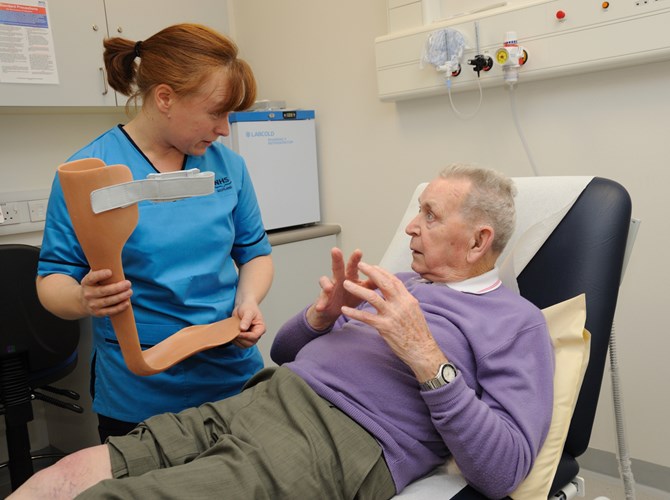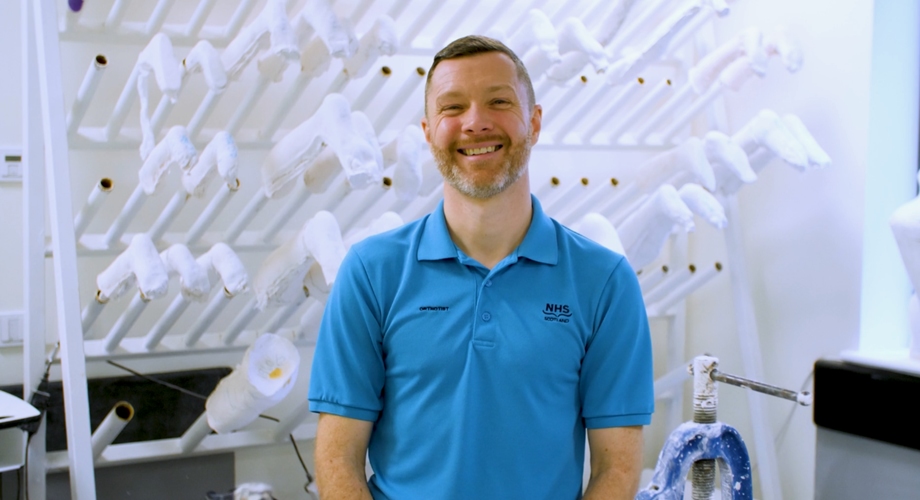Previous
Orthoptist
To become an orthotist in the NHS, you must complete a pre-registration undergraduate degree programme approved by the Health and Care Professions Council (HCPC).
Orthotists work with people of all ages and specialise in the use of splints, braces, or special footwear. These devices, called orthoses, can reduce pain or increase a person's mobility and independence.
Orthotists design, manufacture, and fit orthoses by combining their knowledge of human biology with engineering principles.

To get on a course that could lead to a career as an orthotist, useful school subjects include:
Speak to your guidance teacher or careers adviser about subjects offered at your school.

You may find it helpful to get some healthcare experience by doing a work placement or volunteering. You’ll get training, increase your knowledge, and learn new skills. This could help you when applying to college, university, or a new job with NHSScotland.
To become an orthotist, you’ll need to complete a Prosthetics and Orthotics undergraduate degree programme at SCQF level 10. Most universities accept a wide range of qualifications, giving you the option of applying directly from school or going to college first.
At college, you could do an HND in Engineering Systems at SCQF level 8.
Widening participation supports adult learners who want to go to university. If you’re an adult with few or no qualifications, you could get into higher education through the Scottish Wider Access Programme (SWAP). Many universities also provide access programmes to help you get the degree entry qualifications you need.
In Scotland, the University of Strathclyde offers a four-year pre-registration undergraduate programme in Prosthetics and Orthotics. The programme is approved by the Health and Care Professions Council and the International Society for Prosthetics and Orthotics.
Find out more about the course content and how to apply.
The Health and Care Professions Council (HCPC) sets education, training, and professional practice standards for all allied health professions, including orthotists.
After graduation, you must register with the HCPC. You can then apply as a newly qualified orthotist for vacancies in the NHS.
As an orthotist, you’ll provide aids to address problems or deformities of a patient’s nerves, muscles, or bones.
You'll assess your patient’s condition to design and fit orthoses to aid movement, stop deformities from progressing, or relieve discomfort.
Orthotists treat people from head to toe for a variety of problems, including:
Using measurements, casts, digital imaging, computer-aided design, and computer-aided modelling, you’ll design and fit surgical appliances such as:
Working with orthotic technicians, prosthetists, doctors, nurses, physiotherapists, and occupational therapists, you’ll provide advice to make sure patients receive appropriate rehabilitation and aftercare support.
Typical tasks could include:
You’ll need these skills:
Orthotists work with other healthcare professionals, including:
You could work in:

Discover our 360-degree videos to see how orthotists assess and measure patients. This is the start of a process where they design and fit orthoses that support movement, prevent deformities from worsening, or relieve discomfort.
You'll meet Mel, Head of Paediatric Orthotics, at the Royal Hospital for Children in Glasgow. Mel feels privileged to help children and their families at what can be a difficult time in their lives. He said, "Seeing the positive impact our hard work has on these patients and families is the best part of my job.”
During your career, you'll have to keep your skills and knowledge up to date with continuing professional development (CPD).
The following professional bodies provide CPD activities, including courses, conferences, and seminars where you can exchange ideas and update skills:
You’ll need to renew your registration with the HCPC every 2 years. This includes making a personal declaration that you have done the following:
Find out more about registration renewals.
With training and experience, you may choose to specialise in a particular area of practice, such as:
You could also progress to senior and specialist orthotist roles. As head of an orthotics and prosthetics service, you would be responsible both for a team of staff and for managing a budget.
There are also teaching and research opportunities.
As a registered orthotist, you'll be encouraged to support students on placement and become a practice educator. You’ll provide training opportunities and support the learning, supervision, and assessment of students. These responsibilities will contribute to your professional development.
When you become a qualified orthotist, you must register with the HCPC to work in the NHS. You can also join the following professional bodies:

Discover the range of AHP careers you can choose in the NHS.
Allied health professions
Our blog includes how-to guides, case studies, and career resources.
Discover more